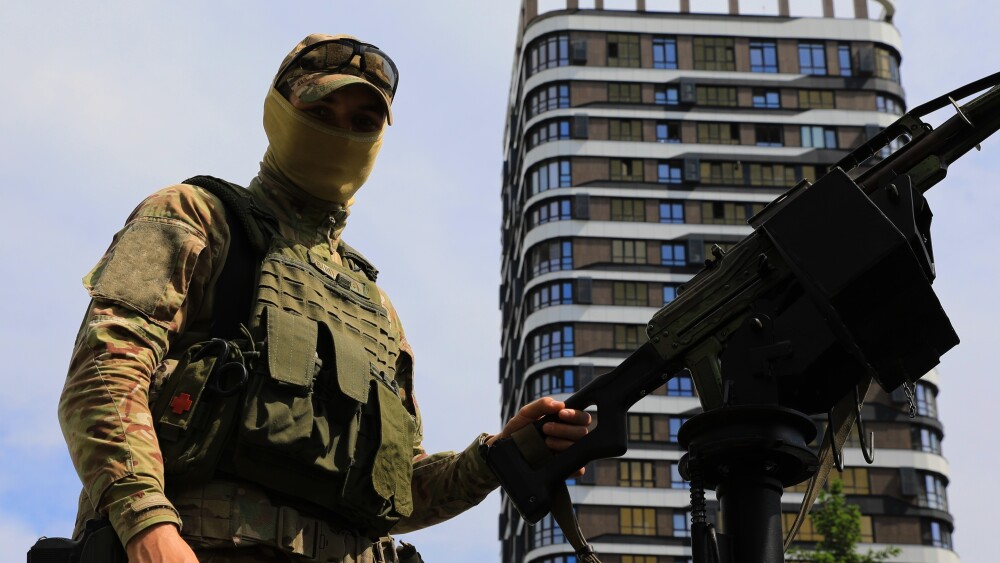by Mardo Soghom
It’s Unclear Whether This Signals Moderation in Iran’s Approach to the West, or Is Aimed at Preventing Another Israeli Attack
 |
An Iranian soldier on June 17, 2025, during the 12-day war with Israel. Shutterstock |
The Islamic Republic of Iran is forming a new National Defense Council and appointed a new secretary of the Supreme National Security Council, though it remains unclear whether the moves signal defiance toward the West and Israel or preparation for potential concessions. One thing, however, is certain: The regime’s top priority is self-preservation, following a military defeat by Israel and mounting domestic crises it no longer can contain.
At the beginning of August 2025, websites close to Iran’s Supreme National Security Council reported upcoming structural changes, including the creation of a new National Defense Council—a body that last existed during the Iran-Iraq war of the 1980s. These reports also mentioned the appointment of Ali Larijani, the former three-term speaker of Parliament and a centrist figure, to the Supreme National Security Council. On August 5, President Masoud Pezeshkian confirmed his appointment, replacing an Islamic Revolutionary Guard Corps general who held the post for more than a year.
In his decree, the president called on the new secretary of the Supreme National Security Council to “monitor and prioritize national security issues and risks, especially emerging and technological threats.”
Some Iranian observers interpret this move as a weakening of the hardliner faction led by Saeed Jalili, a radical politician who has exerted substantial influence over national security policy. Others see it as preparation to face a potential second round of Israeli attacks. Still others argue that the regime appointed Larijani to signal a softer stance to the West, aiming to buy time and avert further sanctions.
The Rouydad24 website in Tehran, summing up local media reactions, wrote on August 6: “The key question is whether Larijani’s return will bring a tangible change in the country’s security policy or merely place a familiar figure in a strategic position.” However, more than two months before the June 2025 Israeli air campaign, Larijani had threatened that if attacked, Iran would have no choice but to opt for nuclear weapons.
The formation of a defense council reflects the scale of the regime’s defeat during the 12-day war with Israel. Israeli forces caught Iran’s leadership off guard, eliminating a significant portion of its senior military commanders and nuclear scientists within the first hours of the campaign. Subsequent Israeli strikes—coordinated and targeted—devastated nuclear and military facilities across Iran, revealing the depth of Israeli intelligence penetration and damaging the regime’s credibility. Combined with escalating domestic crises—particularly water and electricity shortages—these failures have increased the risk of mass unrest.
Within this context, regime officials and state-aligned media in Tehran have repeatedly raised the alarm about a second Israeli assault. A renewed campaign would likely focus not only on military installations but also on personnel—including tens of thousands of Islamic Revolutionary Guard Corps troops and Basij paramilitary forces tasked with suppressing domestic dissent.
Under Iran’s constitution, the Supreme National Security Council holds three key responsibilities:
- Defining defense and security policies within the general framework set by the supreme leader.
- Coordinating political, intelligence, social, cultural, and economic activities in line with defense and security strategies; and
- Mobilizing the nation’s material and moral resources to counter internal and external threats.
The constitution also empowers the supreme leader to resolve disputes among the branches of government and to form councils or bodies to that end. Analysts believe this provision serves as the legal basis for creating the defense council.
Several Tehran-based media outlets suggest that Supreme Leader Ali Khamenei may have lost confidence in Iran’s military leadership and now seeks to centralize decision-making under a body more tightly supervised by the Supreme National Security Council. More likely, the new Defense Council will report to a Supreme National Security Council member, reinforcing its subordinate status.
In practical terms, Iran’s military currently has few tools left to respond to another Israeli air campaign or expected destabilization efforts. Israeli strikes have crippled Iran’s air defenses, and Israel maintains full control of the skies. Neither China nor Russia—despite their ties to Tehran—has stepped in to replace the destroyed systems. As a result, the Islamic Revolutionary Guard Corps and Basij now appear more focused on suppressing internal dissent than defending against external threats.
Larijani’s appointment raises a critical question: Does it signal a shift toward moderation in Iran’s approach to the West, or is a tactical move aimed at preventing a second Israeli attack and forestalling the reactivation of United Nations economic sanctions over nuclear violations?
So far, Tehran’s public stance shows little sign of flexibility. The regime continues to assert its right to enrich uranium and maintain ballistic missile capabilities. It has offered no indication of backing away from its regional agenda of confronting Israel, nor has it signaled any intent to stop supplying military support to Russia in its war against Ukraine.
From this perspective, Larijani’s appointment and the establishment of the National Defense Council may reflect an effort to reorganize state institutions for survival, rather than a fundamental shift in foreign or defense policy.
Mardo Soghom was a journalist and editorial manager at Radio Free Europe/Radio
Liberty for three decades, overseeing the Iran and Afghanistan services
until 2020, and was chief editor of the Iran International English
website.
Source: https://www.meforum.org/mef-observer/iran-revamps-security-council-signaling-survival-mode-after-israeli-assault
No comments:
Post a Comment